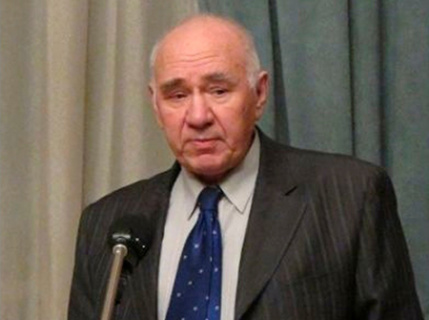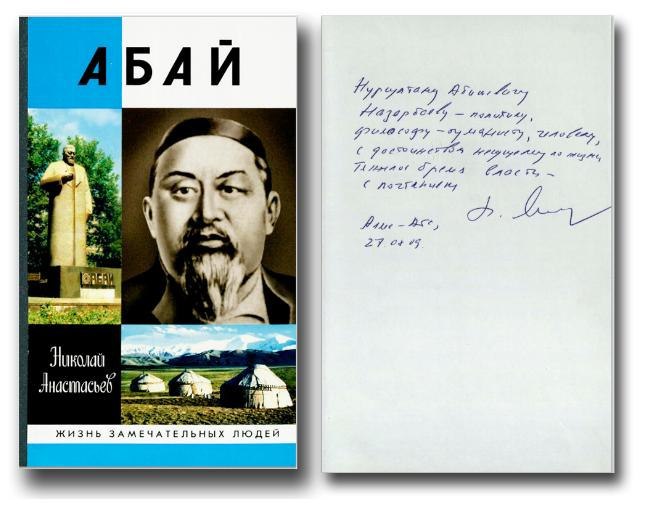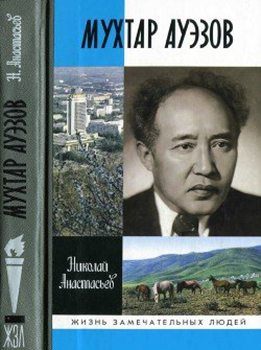People have yet to understand and appreciate the works created by the Kazakh poet and philosopher Abai Kunanbayev.

Nikolai Anastasiev
In Kazakhstan, 2020 has been declared to be the year of the great poet, philosopher and enlightener Abai Kunanbayev. The works of the great poet have not yet lost their relevance. Abai’s philosophical reflections and conclusions remain spiritual nourishment for all of us. We must take his works as a guiding principle in the re-imaging of the nation, said Kazakhstan’s First President Nursultan Nazarbayev.
Kazakh President Kassym-Jomart Tokayev is confident that Abai’s works are timely and relevant. In early spring, he published an article in which he shared his thoughts on the relevance of Abai’s works today and what conclusions the Kazakh people should draw from the poet’s works.
We talked about the relevance and necessity of studying the heritage of Abai with Nikolai Anastasiev, a famous Russian writer, literary critic, and the author of the book “Abai. The Severity of the Flight” and “Mukhtar Auezov. The Triumphant’s Tragedy.”
– Why did you name the book “Abai: The Severity of the Flight”?
– “Severity” – because Abai is power, he is a hardened lump of embodied wisdom, and hard-won knowledge tinged with sorrow. Abai is a sage and a leader of the people, who voluntarily and consciously took upon himself the incredible burden of responsibility for the fate of his country.
But Abai is also a poet, he has Pushkin’s selflessness, Mozart’s lightness, Beranger’s harshness, Byron-Lermontov’s sadness and even gloominess, Goethe’s philosophy… Remembering Alexander Blok, Abai could “understand all – sharp Gallic sense and gloomy Teutonic genius…” And as a Weimar sage, “he could understand the starry book, and the sea wave spoke to him.” The formation of the special relationship between the language of steppe inherited by Abai and the language of Russian literature, and through it, also the literature of the West, is the specific question that I have tried to answer in my book to the best of my ability. Abai, in my view, is a convergence of extremes, a combination of the incompatible, the imprint of the inexpressible. That is why the severity of the flight that I reference in the title of my book is both surmountable and irresistible at the same time.

Nikolai Anastasiev’s book “Abai. The Severity of the Flight” with the gift inscription to Kazakhstan’s First President Nursultan Nazarbayev. Photo credit: Presidentlibrary.kz.
However, Anatole France expressed the same idea much better than me, having guessed the weight of an elephant and the lightness of a butterfly in the Notre Dame Cathedral. Yet this relationship is distinguished by a certain one-sidedness – the West, and, to be honest, Russia has not yet really read Abai, which, by the way, was noted at the Paris meeting of writers and scientists convened at the initiative of UNESCO in the year of the 150th anniversary of birth of the poet.
There are many reasons for this. But the main one lies in the incredible, not yet resolved and, possibly, insoluble difficulties in translating his work. So, alas, this is the situation as it stands now. After all, Pushkin is not really understood in the world – unlike, say, his heirs – Gogol, Tolstoy and Dostoevsky. Of course, I am talking about verses. Abai’s “Words of Edification” are a different matter. Well, there is a certain way of approaching this work, it is explained in the novel by Mukhtar Auezov: “The Path of Abai.”
– It is said that Abai is an Atlas who bore the steppe on his shoulders. What does that mean?

The cover of Nikolai Anastasiev’s book “Mukhtar Auezov. The Triumphant’s Tragedy.”
– Probably, that he concentrated his habits, rituals, beliefs, and the heritage of an entire people in his poetry, music and philosophical prose. “Pushkin is our everything,” said Apollon Grigoriev, and these words echo in the mind and heart of every Russian. The Kazakhs could probably say the same about Abai. Of course, this is not for me to judge, but I will allow myself to make one assumption: in my opinion, the greatness of Abai lies not just in the fact that he brought into focus the history and soul of the nation, but the true feat is that he was able to capture a tectonic shift from one type of civilization to another (Murat Auezov calls it equestrian nomadic civilization), a transition to a different type of consciousness in Kazakh society. Such a task can only be done by a genius. In this sense, I think that Abai’s 38th Word of Edification is comparable in its philosophical richness and depth with works such as Montaigne’s “Of Experience,” Pascal’s “Thoughts,” and Vasily Rozanov’s essays.
It seems to me that Abai felt and recognized himself as a man at a turning point, and this pushed him towards Russian and European enlightenment ideas for inspiration.
– Can Abai be considered the starting point of Kazakh identity?
– I believe that it is better to ask such questions to the legitimate heirs of the culture and native speakers, and not to free, albeit sincerely sympathetic travelers in the fields of Kazakh culture, like myself. But as far as I’m still allowed to judge – yes, of course. Abai laid the spiritual foundations of Kazakh statehood. It was not for nothing that the leaders of the Alash Orda turned to him. Abai is not only a philosopher and poet, he is also a musician, and Kazakhs, in my opinion, are very musical people. And by the way, I think that his poems performed by his own music are much more poetic than the same verses in their purely verbal form. Of course, I am talking about Russian translations, I fully admit that this might not be the case with the originals. The younger Kazakh generation is being brought up on the music of Abai, which they hear from childhood. Probably, this helps them to feel themselves as part of the Kazakh community and to preserve and develop their national identity. As far as I understand, this is the official state policy of Kazakhstan today. Fifty years ago, the number of Kazakh schools could be counted on one hand, but today everything is different. One can only be glad that such close attention is paid to Abai in the country. He is read, published and republished; he is studied. We need to engage in this study even more purposefully and with greater focus while remembering that “between true erudition and knowledge… is the same difference as between science itself and its external features, which often passes for wisdom, eloquence, as well as the energetic, quick thinking people are going for the scientists” (Word 38).
– Why do we need to read Abai?
– This is really a strange question. Why read Shakespeare, Tolstoy, Cervantes, Rabelais, Mark Twain? Firstly, reading is just a pleasure, why would you deny people such a pleasure? “Or wet my thought with tears of joy and pain…” Secondly, reading is an immersive experience of the world and of self-knowledge. Finally, when reading Abai, one recalls a certain prophecy that sounded almost two hundred years ago: the time of national literature is passing, and the era of world literature (Goethe) begins. Of course, this does not mean that Russian, English, French, Kazakh, and any other national literature is being abolished. It just means that at their peaks they form a single space of spirit, image and thought. As the author of the immortal “Moby-Dick” said, “genius all over the world stands hand in hand, and one shock of recognition runs the whole circle round.” Abai in this circle is an equal among equals, a chosen among the chosen.
Well, one more thing. In addition to the obvious artistic and philosophical interest, the heritage of Abai, located at a time of timeless boundaries, has, as it seems to me, a very relevant meaning. As Friedrich Nietzsche used to say, eternal questions walk the street. So, the questions that Abai asked a hundred and a half years ago walk the streets of today’s Kazakh (and not only Kazakh) cities and sound under the arches of Kazakh yurts (nomadic dwellings)
One of the leitmotifs that permeate the Words of Edification (by the way, the translation does not seem to me to be a good one as there is no mentoring in the Words, only a certain directness to them) is the motive of national self-criticism. In our time we are plagued by the toxic miasma of xenophobia and national egoism, and this kind of merciless honesty and deconstruction of one’s own history, morals, spirit, and everyday life practice seems to me extremely important and healing.
I would like to end with the words of Blaise Pascal that were uttered almost 400 years ago and which have a direct bearing on both our time and the hero of our conversation.
“Man’s greatness comes from knowing he is wretched: a tree does not know it is wretched. Thus, it is wretched to know that one is wretched, but there is greatness in knowing one is wretched.”
Abai is like the horizon. And like any horizon, he is unattainable. But striving to comprehend and understand his work is a way of strengthening one’s spirit.

